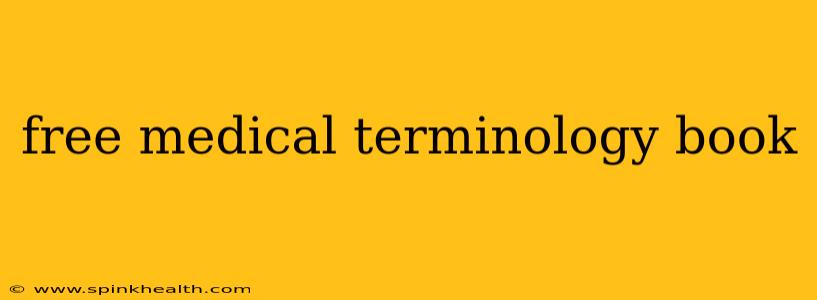Unlock the Secrets of Medical Terminology: Your Journey to Understanding Medical Language Starts Now!
Have you ever felt lost navigating the complex world of medical terms? Imagine understanding doctor's notes, medical reports, or even casual conversations with healthcare professionals with ease. This isn't a superpower; it's achievable with the right resources and a touch of dedication. This guide will illuminate the path to mastering medical terminology, even without spending a dime on expensive textbooks.
Why Learn Medical Terminology?
Before we dive into the treasure trove of free resources, let's explore why learning medical terminology is so valuable. Understanding medical language empowers you in countless ways:
- Improved Patient Care: If you work in healthcare (or aspire to), fluency in medical terminology is paramount for effective communication and patient safety.
- Enhanced Health Literacy: Navigating your own healthcare becomes significantly easier when you can understand the information provided. This allows for more informed decisions regarding your health.
- Career Advancement: Many healthcare and related fields value employees with a strong grasp of medical terminology, opening doors to better opportunities.
- Personal Enrichment: Simply put, it's intellectually stimulating to decipher the meaning behind complex medical terms, broadening your understanding of the human body and its intricacies.
Where to Find Free Medical Terminology Books and Resources:
Now, let's get to the heart of the matter: accessing valuable resources without emptying your wallet. The internet is a vast library brimming with free educational materials. Here are some excellent avenues to explore:
1. Open Educational Resources (OER):
Many universities and educational institutions offer open-access textbooks and materials. Search online for "open educational resources medical terminology" to discover a wealth of free ebooks, lectures, and study guides. These resources are often created by leading experts in the field and are designed to be comprehensive and accessible.
2. Online Medical Terminology Courses:
Numerous websites offer free, introductory courses on medical terminology. These courses often include video lectures, quizzes, and interactive exercises to make learning engaging and effective. Look for courses on platforms like Coursera, edX, and FutureLearn; many offer free audit options, allowing you to access the course materials without paying for a certificate.
3. Public Libraries:
Don't underestimate the power of your local library! Many libraries offer free access to online databases containing medical dictionaries and encyclopedias. These resources provide detailed definitions, pronunciations, and etymologies of medical terms.
4. YouTube Channels and Educational Videos:
YouTube is a surprising goldmine for educational content. Search for "medical terminology tutorial" or "learn medical terminology for beginners" to uncover numerous video lessons, often created by medical professionals and educators. These videos offer a dynamic and visual approach to learning.
5. Medical Terminology Flashcards and Apps:
Numerous free apps and websites offer medical terminology flashcards. These can be invaluable tools for memorization and reinforcement. Use these apps strategically to focus on terms and concepts that challenge you the most.
Frequently Asked Questions (FAQs):
Q: What's the best way to learn medical terminology effectively?
A: The most effective approach involves a combination of methods. Utilize free online resources, create your flashcards, practice regularly, and don't be afraid to seek help or clarification when needed. Consistency is key.
Q: Are there any free medical terminology dictionaries available online?
A: Yes, several reputable medical websites and online dictionaries offer free access to medical terminology definitions. Just be sure to verify the reliability of the source.
Q: How long does it take to learn medical terminology?
A: The time it takes depends on your learning style, prior knowledge, and the depth of your desired understanding. A basic understanding can be achieved within a few weeks of consistent effort, but mastery requires ongoing study and application.
Q: What are some common prefixes, suffixes, and root words I should focus on?
A: Start with common prefixes such as "a-" (without), "ante-" (before), "post-" (after), suffixes like "-itis" (inflammation), "-ectomy" (surgical removal), and root words like "cardi" (heart), "hepat" (liver), and "derm" (skin). Many resources online provide comprehensive lists.
Your journey to mastering medical terminology is just beginning. With the abundance of free resources available, your path to understanding this complex yet fascinating language is now within your reach. Embrace the challenge, celebrate your progress, and enjoy the journey!

